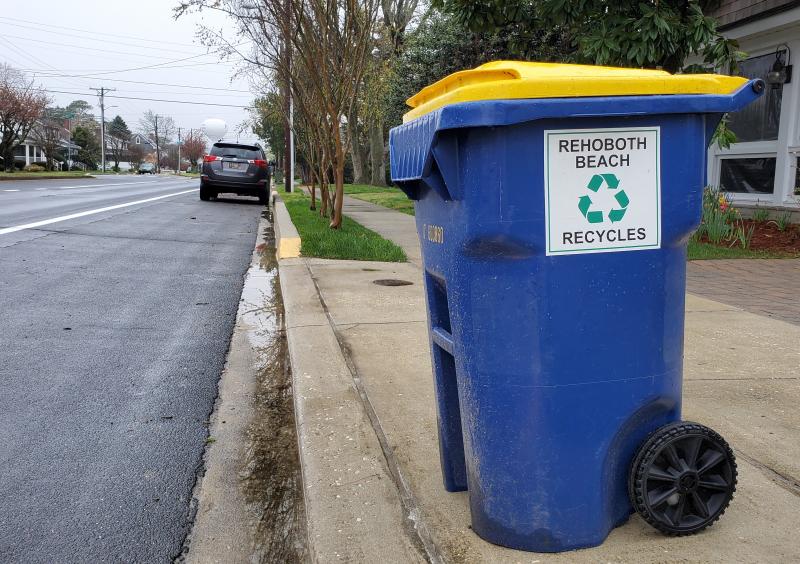Beginning in July, the Delaware Solid Waste Authority is going to start charging recycling haulers when contamination rates exceed 15 percent of a load. In anticipation of that change, the hauler that provides recycling services for Rehoboth Beach has increased the cost of its service by 88 percent.
Rehoboth Beach’s contract with Millsboro-based Blue Hen Disposal expired at the end of April. During a meeting April 16, commissioners unanimously approved a new three-year contract with Blue Hen that ends April 30, 2024. As approved, the city will pay $3.20 per can, per collection, the first year of the contract, $3.50 the second year and $3.70 the third year. The city currently pays $1.70 per can, per collection for its roughly 1,900 recycling cans.
City Manager Sharon Lynn introduced the increase during a special commissioners meeting April 13. She said the city advertised the contract and Blue Hen, the city’s current provider, was the only respondent.
Public Works Director Kevin Williams said he was confident most, if not all, of the increase is a response to how DSWA, the entity that handles all recycling in Delaware, will be collecting recycling beginning in July. He said that’s when DSWA will begin charging a fee on carriers that are bringing loads of contaminated recycling materials. According to DSWA guidelines, “contaminated” simply means that non-recyclable materials are mixed in with acceptable recycling items.
Williams said there will be a six-month grace period at DSWA, during which time DSWA will be auditing truckloads of recycled materials to see what percentage is contaminated. He said there are still questions on how the program will actually be implemented.
Williams said there were discussions about having Blue Hen only do the busy time of year, while the city collected during the off-season, but Blue Hen didn’t want to do that because it’s difficult to figure out how much workforce is needed throughout the year.
In an email April 21, Lynn explained how the increase will affect the city’s budget for fiscal year 2022, which began April 1. She said the recycling contract falls under the contractual services line of the city’s public works department and $192,000 was budgeted this year for all of that line item.
The new contract with Blue Hen, said Lynn, will add roughly $102,000 to that line item, but because other services are not expected to be needed, the total addition to the budget should not exceed $95,000.
Mike Parkowski, DSWA chief of business and governmental services, said the fee isn’t new, but there will be a change in how it’s calculated. He said the plan is to conduct a waste screening audit, set a baseline of expected contamination and then charge haulers for every percentage point when contamination levels exceed 15 percent.
That’s a reasonable percent, said Parkowski, adding that sometimes loads come in as high as 30 percent contaminated. Some of them get really bad, he said.
Parkowski declined to comment on the specifics of the contract between Rehoboth and Blue Hen; however, he said resort towns are traditionally not as good at recycling. People who are full-time residents are much better at recycling than people who are on vacation, he said.
The city has provided its recycling service free since 2006. In her email, Lynn said the city is not considering the implementation of an enterprise fund to help pay for the service.
Chris Flood has been working for the Cape Gazette since early 2014. He currently covers Rehoboth Beach and Henlopen Acres, but has also covered Dewey Beach and the state government. He covers environmental stories, business stories and random stories on subjects he finds interesting, and he also writes a column called Choppin’ Wood that runs every other week. He’s a graduate of the University of Maine and the Landing School of Boat Building & Design.






















































